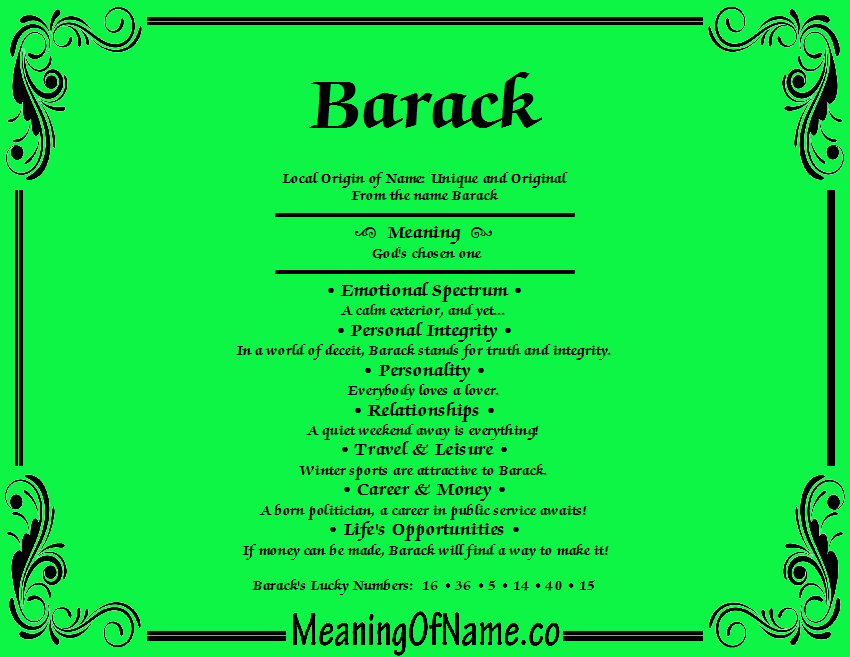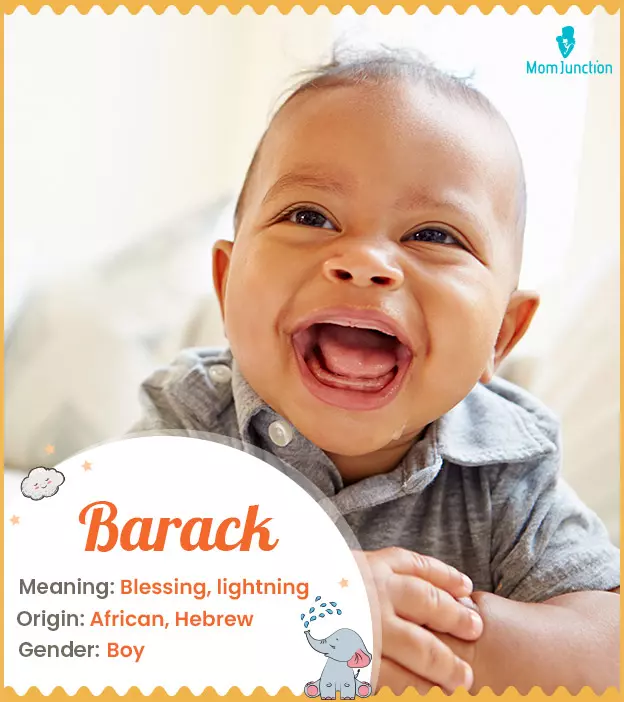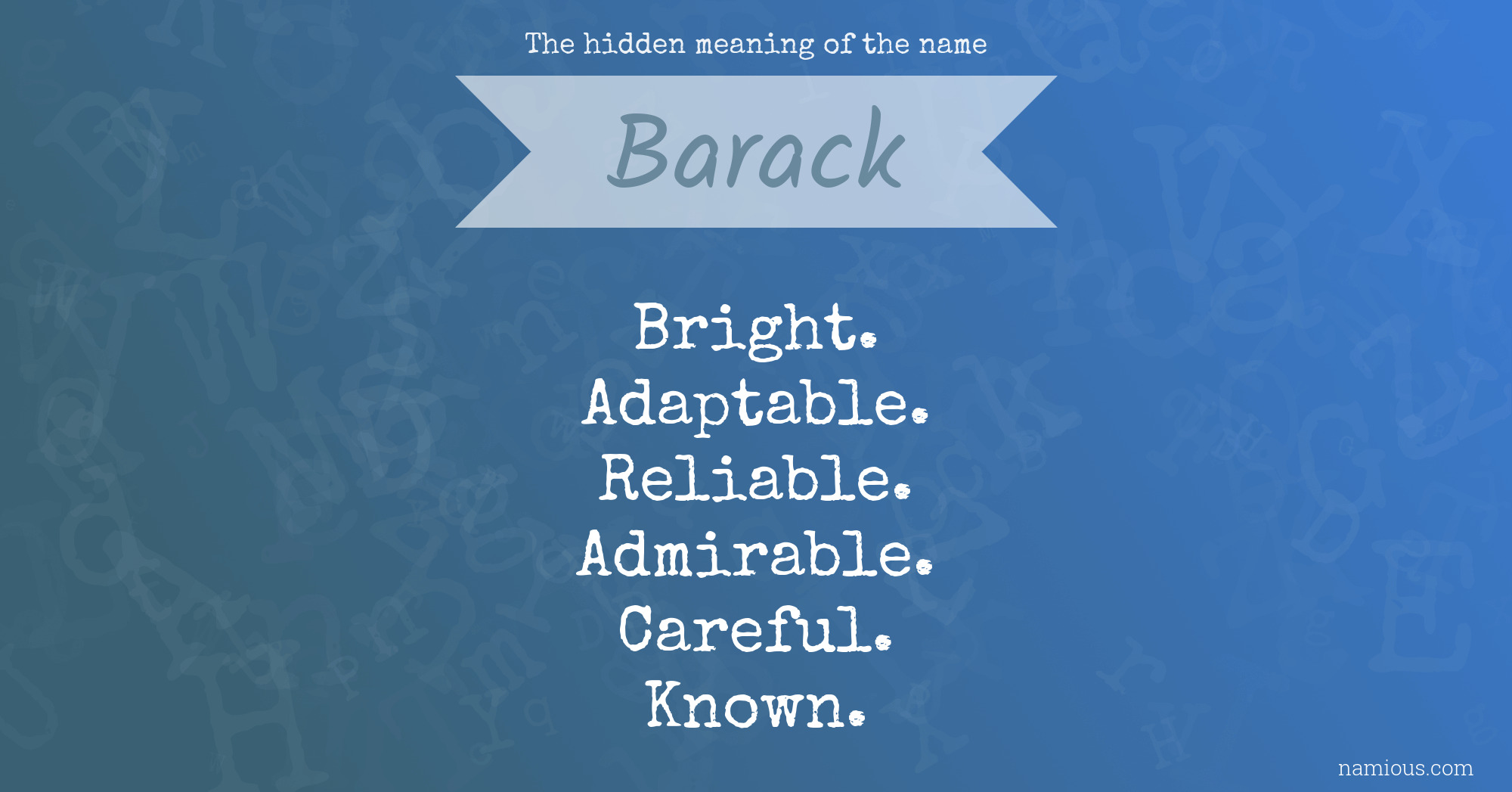Unveiling The Meaning Of "Barack": Origin, History & Significance
What's in a name? More than you might think, especially when that name is "Barack," a moniker that carries layers of history, linguistic roots, and cultural significance. This exploration delves into the multifaceted origins and interpretations of the name, unraveling its journey across languages and its impact on individuals and societies.
The name "Barack," a given name of Arabic origin, immediately sparks curiosity. Often spelled as "Barak" or "Baraq," it resonates with a sense of power and ancient lineage. While its roots are firmly planted in the Arabic language, the name also shares intriguing connections with Hebrew and Swahili, enriching its narrative and expanding its meaning. In essence, "Barack" acts as a crossroads of cultures, carrying within it echoes of diverse traditions and historical moments.
| Attribute | Details |
|---|---|
| Full Name | Barack Hussein Obama II |
| Date of Birth | August 4, 1961 |
| Place of Birth | Honolulu, Hawaii, U.S. |
| Nationality | American |
| Spouse | Michelle Obama |
| Children | Malia Ann Obama, Natasha Obama |
| Education | Columbia University (BA), Harvard Law School (JD) |
| Political Party | Democratic |
| Political Career |
|
| Notable Achievements |
|
| Key Policies |
|
| Links | White House Archives |
The name "Barack" isn't merely a string of letters; its a vessel of meaning. In Arabic, it can denote "blessing," mirroring the Swahili word "baraka," which holds the same significance. This connection highlights the name's African roots, a testament to the cultural exchanges that have shaped the name's identity. The convergence of Arabic and Swahili origins reflects a shared heritage of language and spirituality across continents. The etymology of the name has even made its way in the Bible, where the name "Barak" means "lightning" or "flash" and appears in various contexts, often symbolizing divine power or sudden revelation.
Beyond its Arabic and Swahili derivations, "Barack" also finds its roots in Hebrew, where it echoes the word "baruch," signifying "blessed." This linguistic link underscores the name's capacity to embody both fortune and spiritual favor. The Hebrew connection adds another layer to the narrative, presenting "Barack" not only as a symbol of blessing but also as a testament to faith and divine grace.
The exploration of the name Barack also leads us to historical and biblical contexts. The name appears in the Old Testament, referring to a valiant warrior who, with the help of the prophetess Deborah, achieved victory against overwhelming odds. The story of Barak illustrates themes of courage, cooperation, and triumph over adversity. This particular usage of the name Barack adds a heroic dimension, associating it with strength, resilience, and the ability to overcome challenges. Further exploration into the etymology of the name will unveil the name in Sabean, Palmyrene and Punic origins.
The name "Barack" has undeniably gained global recognition in recent times, largely due to Barack Obama, the 44th President of the United States. His Kenyan and American heritage intertwined with the name's diverse cultural influences elevated "Barack" to an international stage. Barack Obama's presidency brought this name into the spotlight, attaching it to notions of leadership, change, and global influence. His legacy has significantly enhanced the name's prominence and positive connotations.
Traditional African naming practices often reflect the conditions surrounding a childs birth or the hopes parents have for their childs future. Sometimes these names hint at the circumstances of birth or the aspirations parents hold for their offspring. While the name "Obama" could derive from a Luo clan name, it does not have a well-defined etymology. Therefore, some theories propose that "Obama" could relate to physical conditions at birth, such as a crooked spine or a difficult delivery.
The significance of the name "Barack" extends beyond its linguistic roots and historical connections. Its versatility allows it to blend in with diverse cultural contexts. Whether used in English, Hebrew, or other languages, "Barack" maintains its symbolic resonance and adaptability. The names diverse adoption across cultures mirrors the names potential to resonate with people of all backgrounds. The various ways "Barack" is used and pronounced emphasize its flexible nature, making it accessible and meaningful across borders.
Moreover, the variants of the name "Barack," such as "Barak," "Baraq," and "Baruch," each carry a distinct flavor, yet they share a common origin. These derivative forms contribute to the rich landscape of the name. The various forms of "Barack" are a testament to the name's adaptability. Each variation offers a different shade of meaning, enriching the name's diverse characteristics.
The association with "lightning" and "thunderbolt" gives "Barack" an aura of dynamism and power. This meaning is a stark contrast to the "blessing" interpretation and exemplifies the diverse layers within the name. The juxtaposition of these meanings creates a symbol of resilience. The idea of strength coexisting with benediction highlights the multifaceted nature of "Barack." The name "Barack" embraces both the dynamic forces of nature and the tranquil essence of divine favor.
In summary, the name "Barack" offers a rich tapestry of meanings, ranging from "blessing" to "lightning," across several languages and cultures. The name's association with Barack Obama has further amplified its global presence and positive image. Through its diverse roots in Arabic, Hebrew, and Swahili, "Barack" embodies heritage and versatility. It is a name that symbolizes a fusion of history, culture, and personal identity. As a result, "Barack" endures as a name with cultural significance and enduring resonance.


